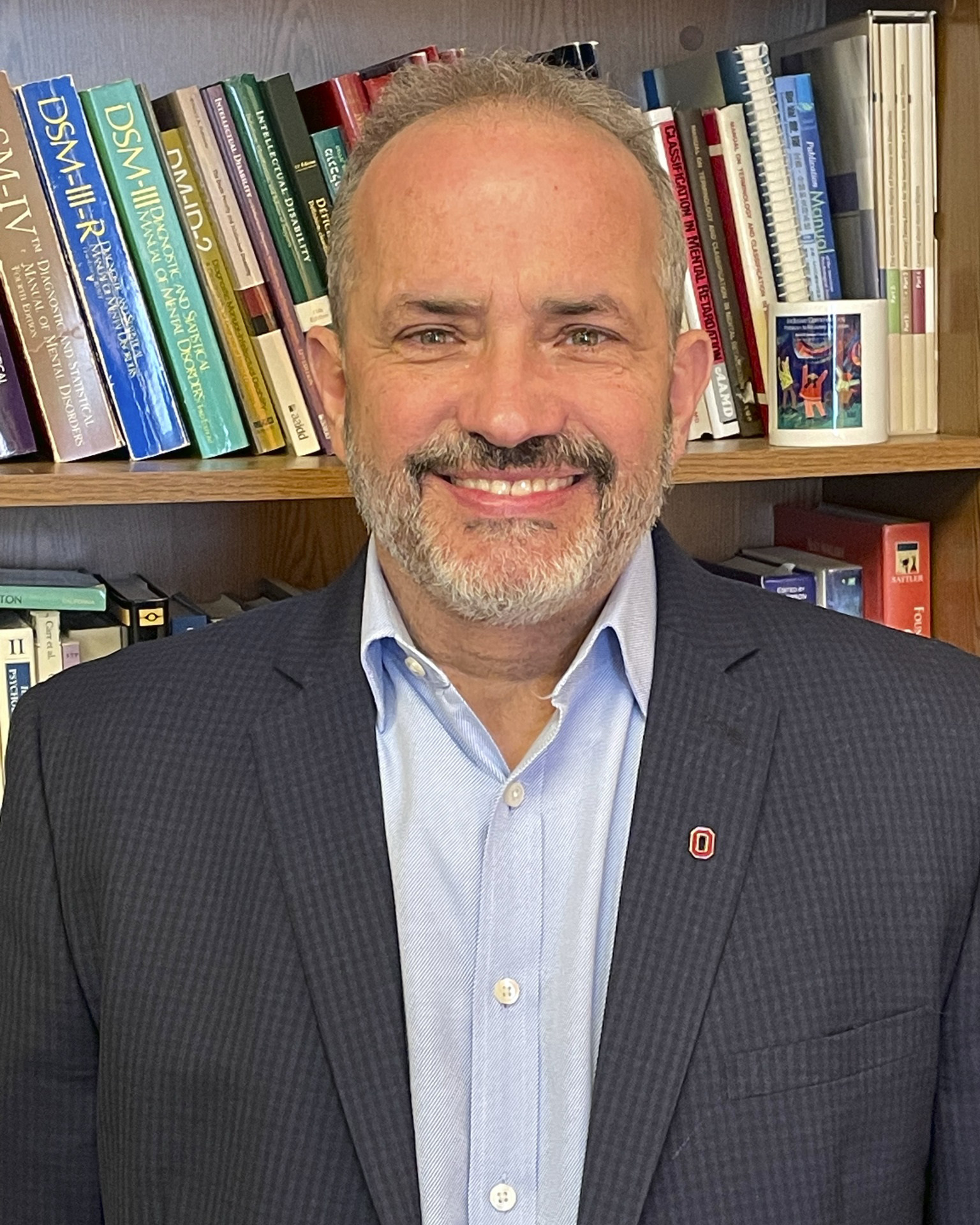For more detailed information about program requirements and expectations, view the IDD Psychology Program section on the Nisonger Center website or view the program handbook.
Intellectual and Developmental Disabilities Program Handbook →
Overview
Students in the Intellectual and Developmental Disabilities (IDD) graduate program train in scientific clinical psychology with a focus on IDD, which concerns children and adults with intellectual disability, autism spectrum disorder, and other related neurodevelopmental disorders. Scientific clinical psychology fully applies to individuals with IDD, just as in non-disabled groups, and is a specialization in its own right.
Providing in-depth, doctoral-level specialized research and clinical training in this area, Ohio State's IDD graduate program is one of the only of its kind. Emphases of the program include the assessment and diagnosis of intellectual and developmental disabilities, diagnosis and treatment of mental health problems co-occurring with IDD, early intervention, problem (e.g., dangerous and destructive) behaviors, instrument development, health disparities, stakeholder engagement and self-advocacy, and parent training/family support.
Students who graduate from the IDD program are eligible for licensure as psychologists in most states. The program trains and prepares students for a variety of clinical science careers, including conducting research; teaching at the college level; providing clinical care as psychologists in university, hospital, clinic, private practice, or other settings serving people with IDD; and program administration and leadership roles in the disability field.
Accreditation
The Intellectual and Developmental Disabilities graduate program has been nationally accredited by the Psychological Clinical Science Accreditation System (PCSAS) since December 2021. Its coursework, practicum experiences, and internships are also closely aligned with American Psychological Association standards to ensure that graduates meet the Association of State and Provincial Psychology Boards (ASPPB) requirements for licensure as psychologists in most states.
Qualifications
Applicants to the Intellectual and Developmental Disabilities graduate program should be interested in any area of clinical psychology practice or research relevant to IDD. Applications are evaluated holistically, with a variety of factors taken into consideration, and students who meet eligibility criteria for one or more fellowships are likely to be especially competitive (see Section 5.1.2 of University Fellowship guidelines). However, students with lower scores but with exceptional records in other areas (e.g., research experience, clinical experience, letters of recommendation) may still gain admission.
Program of study
The Intellectual and Developmental Disabilities graduate program involves research training, clinical training, IDD leadership training, and coursework. It is designed to be completed in five to six years.
In their first two years, students focus on core coursework and introductory practica. By the end of their second year, they are expected to complete their Master's thesis, as well as a fellowship with the Leadership Education in Neurodevelopmental Disabilities (LEND) Program. Students typically sit for their candidacy examination at the end of their third year and spend their remaining time in the program preparing their dissertation and completing a variety of advanced practica and internships.
Coursework
IDD program students must complete their coursework prior to the candidacy exam. Students must take courses in the following areas:
- Statistics (Psych 6810 and 6811: Statistical Methods in Psychology, plus a third course of their choosing)
- Research methods (Psych 6861: Research Design and Methods in Clinical Psychology)
- Psychological assessment (Psych 6863: Psychometrics and Psych 7858: Seminar in the Assessment of Developmental Disabilities
- Biological bases of behavior (Psych 5613H: Biological Psychiatry)
- Human development (e.g., Psych 7845: Cognitive Development or Psych 7847: Language Development)
- History and systems (e.g., Psych 6809: Historical Development of Psychology)
- Psychopathology (Psych 6853: Lifespan Developmental Psychopathology I and Psych 6854: Lifespan Developmental Psychopathology II)
- Social bases of behavior (e.g., Psych 6870: Basic Principles of Social Psychology or Psych 7871: Social Cognition)
- Cognitive-affective bases of behavior (e.g., Psych 5089: Cognitive Aging, Neurodegeneration, and Neuroplasticity)
- IDD-specific courses (e.g., Psych 7717: Developmental Disabilities: An Interdisciplinary Perspective and Psych 7718: Autism Spectrum Disorders)
Fieldwork
The IDD program requires students to take a total of 18 credit hours of fieldwork. In their second year, they complete an introductory practicum in the Nisonger Center LEND diagnostic clinics, such as the Interdisciplinary Developmental Clinic, School-Age Autism and Developmental Clinic, and Transition Clinic. Students in these clinics receive direct training and supervision in clinical interviewing, administration and interpretation and psychological and developmental tests, delivering feedback to families regarding diagnosis, interdisciplinary teaming, and integrated report writing
Between their third and fifth years, students complete advanced practica that build their clinical skills in a variety of areas of assessment and intervention with IDD populations. Placements occur both within and outside of the Nisonger Center and recently have included Nationwide Children’s Hospital Child Development Center, Haugland Learning Center, I am Boundless, Inc., and Nisonger Early Learning Program, among others. All practicum placements are overseen by supervised licensed clinical psychologists.
Internship
In their final years of the program, IDD graduate students are required to complete 1,800 internship hours in an applied setting serving children or adults with intellectual and developmental disabilities. Students work together with IDD faculty to identify appropriate internship placements. Recent placements have included Nationwide Children’s Hospital Center for Autism Spectrum Disorders, Haugland Learning Center, I Am Boundless, and Kennedy Krieger Institute, among others.
LEND Fellowship
IDD graduate students also must complete LEND (Leadership Education in Neurodevelopmental Disabilities) fellowship training. Graduates of the LEND program are trained to work with colleagues in interdisciplinary systems of health care that are comprehensive, coordinated, family-centered and culturally sensitive. They anticipate, manage and guide change in knowledge and health care systems to advance and improve the lives of individuals with neurodevelopmental disabilities and their families.
Facilities
The hub of IDD graduate program activity, training, and research is the Nisonger Center, a federally recognized University Center for Excellence in Developmental Disabilities (UCEDD). Part of The Ohio State University Wexner Medical Center, the Nisonger Center is one of 67 UCEDDs nationwide mandated to conduct applied research and provide interdisciplinary training in intellectual and developmental disabilities.
Most IDD program faculty offices, research space, service programs, and student offices are at the Nisonger Center, located in McCampbell Hall at 1581 Dodd Drive, Columbus, OH. Most IDD courses are offered in the Psychology Building on Ohio State's Columbus campus.
Faculty



Area contacts
Intellectual and Developmental Disabilities Area Coordinator: Dr. Luc Lecavalier (Luc.Lecavalier@osumc.edu)


